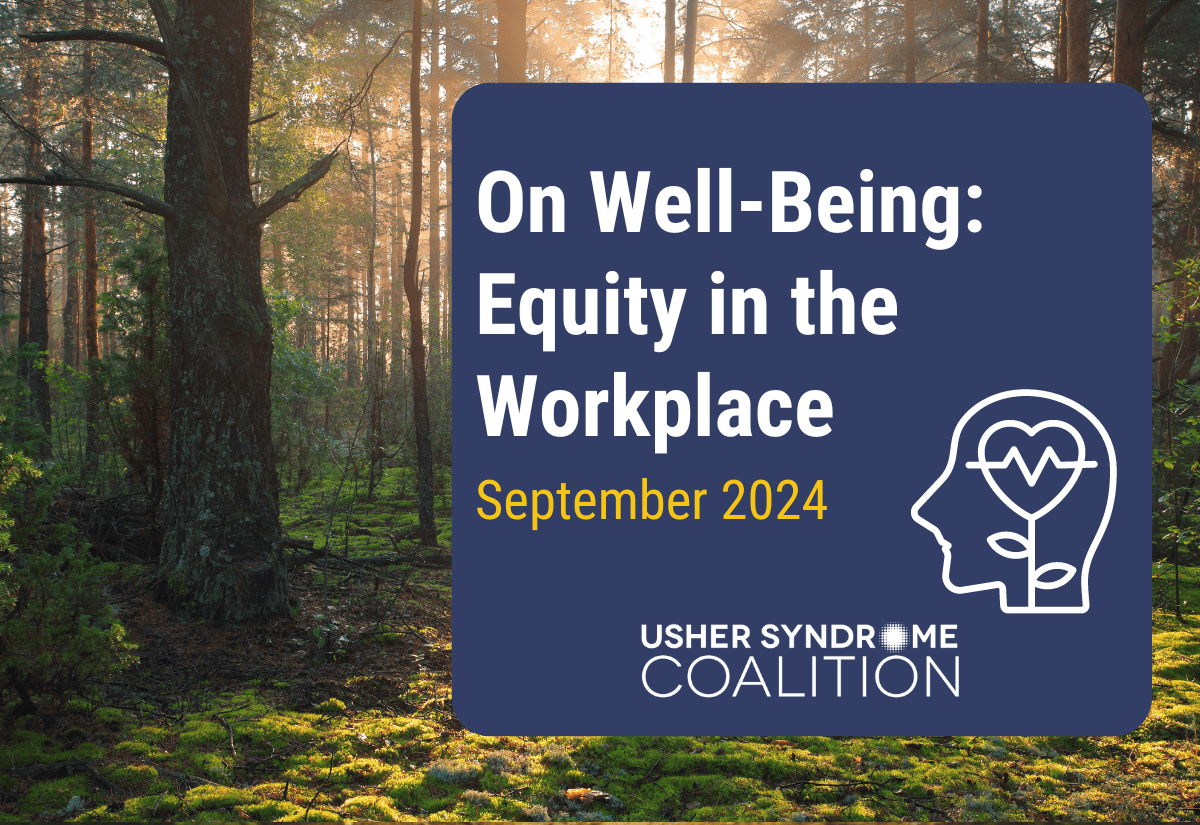
By Lawreen Asuncion, Usher Syndrome Coalition Volunteer
Living with Usher syndrome challenges us all. Navigating daily life often requires various adjustments and accommodations, which can be taxing and stressful. Fortunately, we can adapt as needed—whether exploring hearing aids or cochlear implants for hearing impairments or using glasses, canes or guide dogs for visual impairments.
However, this freedom doesn’t always extend to the workplace, where many in our community struggle with disability equity. A pressing concern is how to address disability needs in the work environment—whether as a candidate or employee—without risking conscious or subconscious discrimination.
This issue arises during the application process, where it’s common to encounter voluntary Equal Employment Opportunity (EEO) questions about gender, race, veteran status, and disability. The list of disabilities is extensive, ranging from migraines to cancer, and it includes hearing loss and blindness. As an applicant, you’re asked to respond: a) Yes, I have or have had a disability; b) No, I do not have a disability; or c) I do not wish to answer.
This creates a dilemma:
- If you answer "a," you may risk discrimination.
- If you answer "b," you could be perceived as dishonest.
- If you choose "c," it might imply you have a disability but prefer not to disclose it.
Since responding to these questions is voluntary, what’s the best approach for our community? Let me share my story before offering my recommendation.
Recently, as I’ve navigated the job market, I’ve struggled with how to best answer the disability question. Historically, I answered "b” or “no," focusing on my qualifications rather than my need for accommodations, which were minimal at the time. However, as I’ve grown older and required more accommodations, I believed full transparency was the best approach. I had nothing to hide and still brought the same qualifications to the table, so I changed my response to “a” or “yes.”
Unfortunately, I discovered that despite progress in diversity, equity, inclusion (DEI), and disability awareness, human bias persists. These biases can stem from upbringing, ingrained beliefs, or assumptions—whether right or wrong. In my case, I faced discrimination based on the assumption that my disability would prevent me from performing the job despite my years of proven experience.
According to a 5-year United Kingdom Longitudinal Study published in 2020, perceived disability-related discrimination significantly impacts well-being. In this cohort study, over 13% of participants who self-reported their disability experienced disability-related discrimination, leading to depression, poor health, greater psychological distress, worsening mental function, and low life satisfaction.
So, what does this mean for our USH community? How should we approach the EEO disability question?
I revised my strategy and now select "b” or “No" to the voluntary disability question. By controlling my narrative as an applicant, I minimize the potential for bias or discrimination from the outset, reducing unnecessary stress. As an employee, I request accommodations as needed to ensure I perform and deliver my best.
Our disabilities do not define who we are nor limit what we can achieve. By controlling our narrative, we can manage perceived discrimination and, consequently, our own well-being.
How have you handled this disability question? Have any of you experienced disability-based discrimination? How did you feel, and how did you overcome it?







